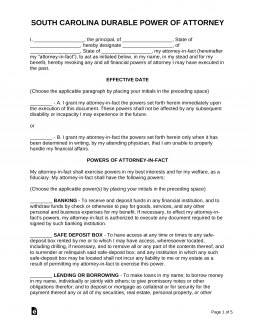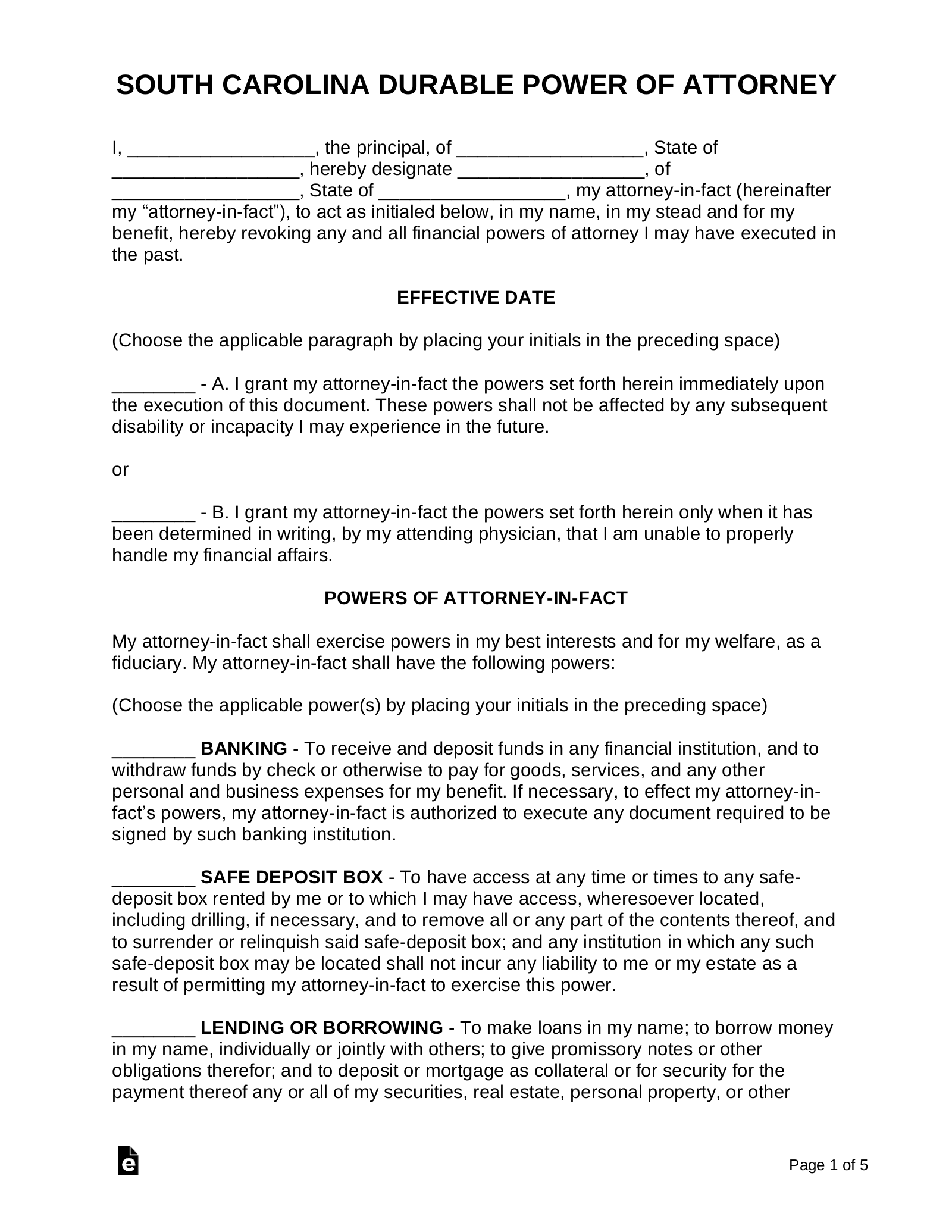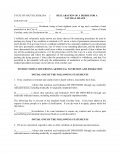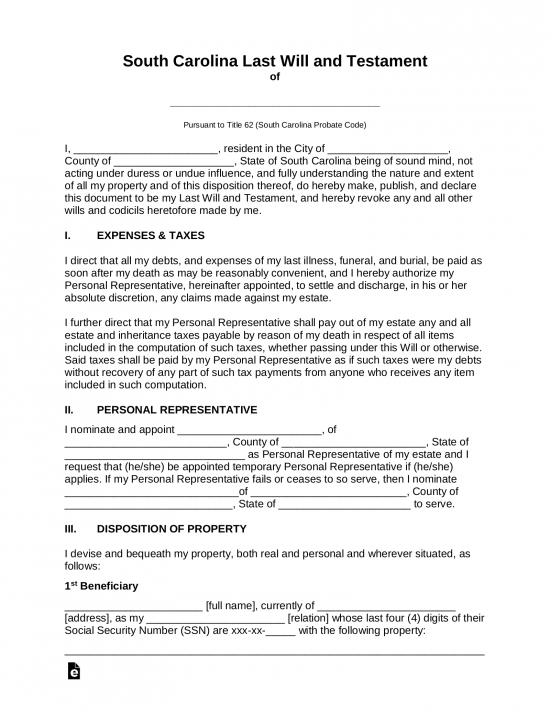Updated October 11, 2023
A South Carolina durable power of attorney is a statutory form that lets a person choose someone else to handle financial decisions and conduct business affairs on their behalf. The person giving power (the “principal”) should only give power to a trusted person (the “agent”), particularly because this “durable” version lasts the lifetime of the principal unless revoked.
Table of Contents |
Laws
Probate Code, Title 62, Article 8 (Uniform Power of Attorney Act)
Definition of “Durable”
“Durable,” with respect to a power of attorney, means not terminated by the principal’s incapacity (§ 62-8-102(2)).
Definition of “Power of Attorney”
“Power of attorney” means a writing or other record that grants authority to an agent to act in the place of the principal, whether or not the term “power of attorney” is used (§ 62-8-102(7)).
Signing Requirements
The principal must sign in the presence of two (2) witnesses and acknowledged before a notary public (§ 62-8-105).
Statutory Form
The South Carolina legislature has not made available a statutory power of attorney form.
How to Write
Download: PDF, MS Word, OpenDocument
1 – The File Displayed In The Preview Image Can Be Used To Delegate Authority
This page will provide some instruction and a template form you may download. This document can be used to deliver a determined Principal Authority to an Attorney-in-Fact or Principal Agent. The Principal’s direct participation will be mandatory once all the preliminary information has been supplied. When ready, download a copy of this form using one of the buttons under the image presented.
2 – Introduce Each Party By Assigning Each One Its Role
Once this document is ready to be filled out, open it then turn your attention to the first paragraph. Here, we will need to produce some information that is both mandatory and crucial to the execution of this form. Notice that several blank lines have been presented in the language. These must be filled out. Proceed by entering the Full Name of the person who is appointing an Agent with the same Authority he or she carries on the first blank line. This individual will be known as the Principal and the Authority he or she delivers will be referred to as Principal Power. 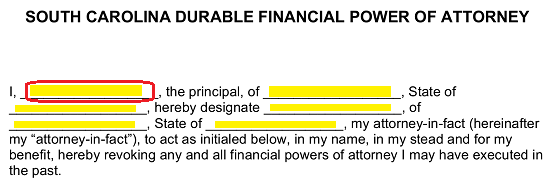 The Name of the Principal will not be enough to identify him or her for the purpose of this form. We will also need to document the Residential Street Address and the State where he or she lives. Use the second and third empty spaces in this introduction to document these items properly.
The Name of the Principal will not be enough to identify him or her for the purpose of this form. We will also need to document the Residential Street Address and the State where he or she lives. Use the second and third empty spaces in this introduction to document these items properly. 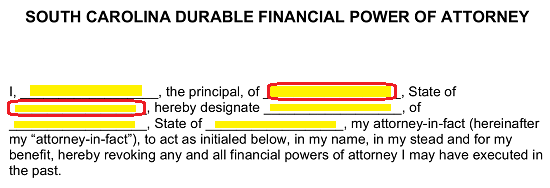 Now, we shall turn our attention to the Attorney-in-Fact or the person who will accept the responsibility and Principal Power begin assigned to him or her by the Principal above. Three separate spaces have been supplied after the language “…Hereby Designate.” The first line after this phrase should have the Attorney-in-Fact’s legal Name entered on it.
Now, we shall turn our attention to the Attorney-in-Fact or the person who will accept the responsibility and Principal Power begin assigned to him or her by the Principal above. Three separate spaces have been supplied after the language “…Hereby Designate.” The first line after this phrase should have the Attorney-in-Fact’s legal Name entered on it. 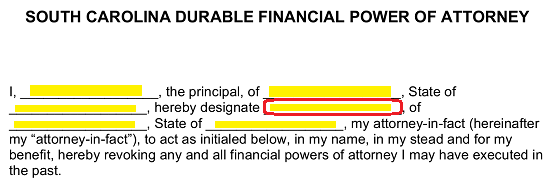 The last two lines have been supplied so the Attorney-in-Fact’s Residential Address and Residential State may also be documented. Locate the line after the Attorney-in-Fact’s Name reported above then supply his or her Residential Street Address. Follow this by documenting the State of Residence on the last blank space.
The last two lines have been supplied so the Attorney-in-Fact’s Residential Address and Residential State may also be documented. Locate the line after the Attorney-in-Fact’s Name reported above then supply his or her Residential Street Address. Follow this by documenting the State of Residence on the last blank space. 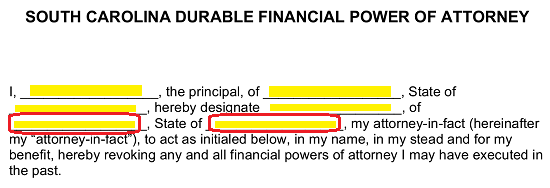
3 – A Specific Start Date Or Start Event Must Apply To This Appointment
Before the Principal defines the Power he or she wishes to grant to the Attorney-in-Fact, the time period when the Principal wishes these Powers to be Effective must be addressed. This will be accomplished using the section labeled “Effective Date.” Two statement options are presented in this section. It will be up to the Principal to choose which one should be an appropriate definition of when the Principal Powers in this document go into effect. If this document is effective upon execution the Principal will need to initial the blank line preceding the bold letter “A.” Otherwise, the Principal can choose to have these Powers become available only if or when the Principal has been diagnosed as unable to communicate or carry out his or her own decisions by a Physician. If the Principal wishes these Powers to be delivered only upon such diagnoses (written), then he or she should initial the blank line preceding the bold letter “B.”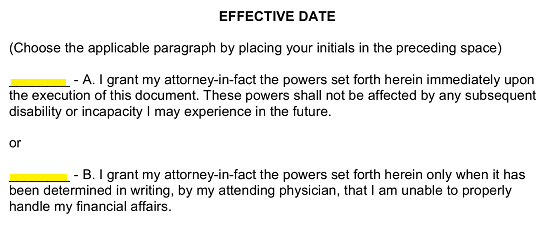
4 – The Principal’s Initials Are The Only Item That Can Apply A Type Of Power To The Agent’s Principal Authority
The Principal will now need to provide an accurate definition of the Principal Powers he or she intends to designate to the Attorney-in-Fact. Any such intention will need to be reliably verified. The list presented in “Powers Of Attorney-in-Fact” will satisfy this requirement nicely. Here, the language a Principal will require to approve an Attorney-in-Fact’s ability to make decisions and enact such decisions on the Principal’s behalf will be supplied. The full scope of Principal Powers will be represented across several subject matters, each with a specific list of actions and decisions pertaining to that subject. The Principal need only give an in-depth review of the list of Principal Matters here, then initial the blank line preceding each statement that should be included in his or her definition of the Attorney-in-Fact’s Principal Powers. If the Principal does not wish to deliver certain Powers to the Attorney-in-Fact, he or she should not initial that statement. The Principal will be able to adjust the granted Powers in the section following this one.
As mentioned above, this list will be divided into several subject matters. We shall give a quick review of these subjects and the individual matters the Principal can assign his or Authority to the Agent over. The first three subject matters will have a direct impact on the Principal’s Finances and will be designated with the labels: “Banking,” “Safe Deposit Box,” and “Lending Or Borrowing.” Each one of these labeled paragraphs will contain a description of the Attorney-in-Fact behavior the Principal will authorize when he or she initials the blank line corresponding to that Principal Matter. The Principal may initial or refrain from initialing any of these items with the understanding that any item left blank will not be assigned as a Principal Power to the Attorney-in-Fact. 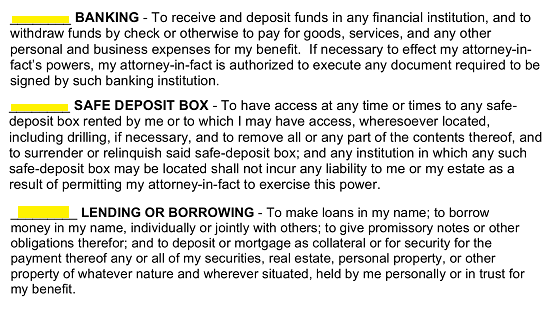 The next several matters to be discussed will be labeled as “Government Benefits,” “Retirement Plan,” “Taxes,” and “Insurance.” The Principal should give a serious look at the contents of these paragraphs since, initialing any of these paragraphs will give the Attorney-in-Fact a significant amount of Power in any of the areas as defined by those areas. If the Principal does not wish to deliver the Principal Powers in one of these descriptions to the Agent, he or she should not initial that paragraph. If the Agent should have the Principal Power to conduct the business in a paragraph, the Principal should initial that paragraph.
The next several matters to be discussed will be labeled as “Government Benefits,” “Retirement Plan,” “Taxes,” and “Insurance.” The Principal should give a serious look at the contents of these paragraphs since, initialing any of these paragraphs will give the Attorney-in-Fact a significant amount of Power in any of the areas as defined by those areas. If the Principal does not wish to deliver the Principal Powers in one of these descriptions to the Agent, he or she should not initial that paragraph. If the Agent should have the Principal Power to conduct the business in a paragraph, the Principal should initial that paragraph.  The Principal will now have the option of delivering the Principal Power to handle his or her “Real Estate” and/or “Personal Property” as well as the “Power To Manage Property” through the language in the next three matters defined. The Principal retains the right to initial any or none of these paragraphs depending on his or her intentions.
The Principal will now have the option of delivering the Principal Power to handle his or her “Real Estate” and/or “Personal Property” as well as the “Power To Manage Property” through the language in the next three matters defined. The Principal retains the right to initial any or none of these paragraphs depending on his or her intentions. 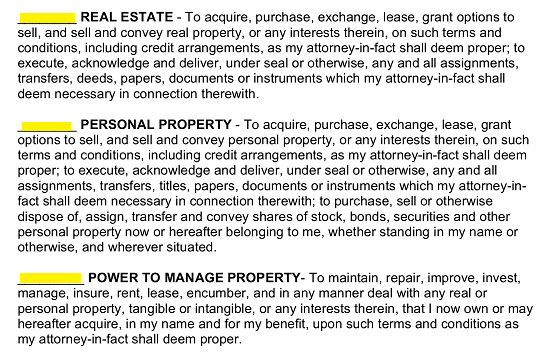 Next, the Principal can give the Attorney-in-Fact the Authority to deal with Gifts (by using the Principal’s Name to give, receive, cancel, obligate, or forgive on behalf of the Principal). He or she will need to initial the blank line preceding the word “Gifts” to grant the Powers defined in this area.
Next, the Principal can give the Attorney-in-Fact the Authority to deal with Gifts (by using the Principal’s Name to give, receive, cancel, obligate, or forgive on behalf of the Principal). He or she will need to initial the blank line preceding the word “Gifts” to grant the Powers defined in this area.  The Principal may have determined the Attorney-in-Fact should have the Principal Authority to deal with “Legal Advice And Proceedings” on behalf of the Principal and if so, he or she should initial the blank line that precedes this item.
The Principal may have determined the Attorney-in-Fact should have the Principal Authority to deal with “Legal Advice And Proceedings” on behalf of the Principal and if so, he or she should initial the blank line that precedes this item.  Finally, in the section labeled “Special Instructions” the Principal may use his or her own language to supplement the Principal Powers he or she delivered to the Agent by initialing the appropriate items above. Nearly any issue can be addressed, and this may include limitations, instructions, or extensions the Principal wishes applied in this document. Several blank lines have been supplied in this section for this purpose, however, if more room is required you may continue this report using an attachment so long as it is accurately labeled and dated. If no such instructions exist, you may simply write or type in the word “None.”
Finally, in the section labeled “Special Instructions” the Principal may use his or her own language to supplement the Principal Powers he or she delivered to the Agent by initialing the appropriate items above. Nearly any issue can be addressed, and this may include limitations, instructions, or extensions the Principal wishes applied in this document. Several blank lines have been supplied in this section for this purpose, however, if more room is required you may continue this report using an attachment so long as it is accurately labeled and dated. If no such instructions exist, you may simply write or type in the word “None.”
5 – The Principal’s Signature Must Be Supplied To Execute This Document
This document will not be taken as the Principal’s true intentions unless it has been signed by the Principal. This Signature must be dated, witnessed, and notarized. Thus, make sure that all the parties have coordinated their schedules according to this signing. Near the end of this document will be a statement beginning with the three words “In Witness Wherof.” The Principal must use this sentence to record the Date he or she is providing the Principal Signature. It will contain three empty lines for this purpose. ![]() The Principal’s Signature line is presented directly below the Signature Date sentence. The Principal must provide his or her Signature to this line on the Date he or she reported above.
The Principal’s Signature line is presented directly below the Signature Date sentence. The Principal must provide his or her Signature to this line on the Date he or she reported above.  As mentioned, this signing must be witnessed. Two separate individuals must view the Principal Signing as it occurs, read the testimonial provided below the Principal Signature, then verify its accuracy by signing their Names and presenting their addresses.
As mentioned, this signing must be witnessed. Two separate individuals must view the Principal Signing as it occurs, read the testimonial provided below the Principal Signature, then verify its accuracy by signing their Names and presenting their addresses. 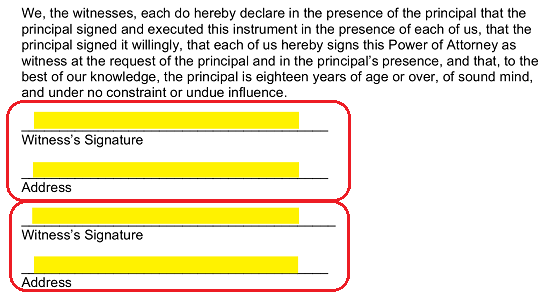 The section of this paperwork immediately following the Witness Testimony is for the exclusive use of notarizing the Principal Signing. Only the Notary Public in attendance may supply the items required for this.
The section of this paperwork immediately following the Witness Testimony is for the exclusive use of notarizing the Principal Signing. Only the Notary Public in attendance may supply the items required for this. 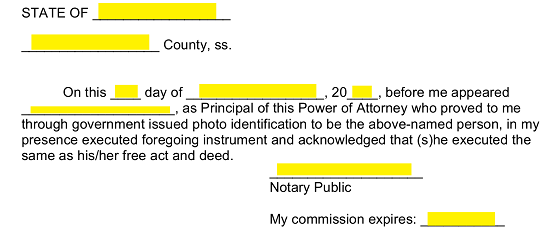 Finally, print the Attorney-in-Fact’s name on the blank line of the “Specimen Signature Of Attorney-in-Fact” page. The Attorney-in-Fact must agree with the statement on this page by providing a notarized signature on the blank line labeled “Attorney-in-Fact’s Signature”
Finally, print the Attorney-in-Fact’s name on the blank line of the “Specimen Signature Of Attorney-in-Fact” page. The Attorney-in-Fact must agree with the statement on this page by providing a notarized signature on the blank line labeled “Attorney-in-Fact’s Signature” The Notary Public notarizing the Attorney-in-Fact’s Signature may do so using the structured area directly below the Attorney-in-Fact’s Signature.
The Notary Public notarizing the Attorney-in-Fact’s Signature may do so using the structured area directly below the Attorney-in-Fact’s Signature.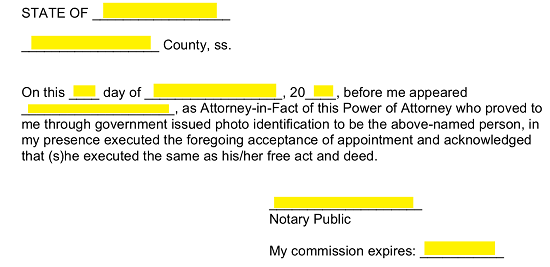
Related Forms
Download: PDF

